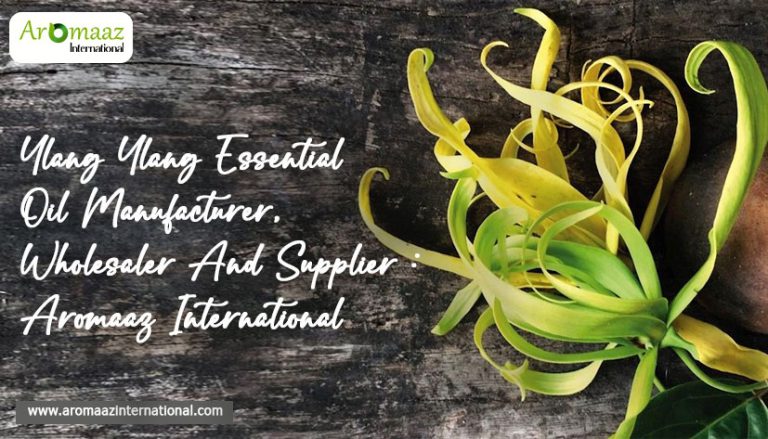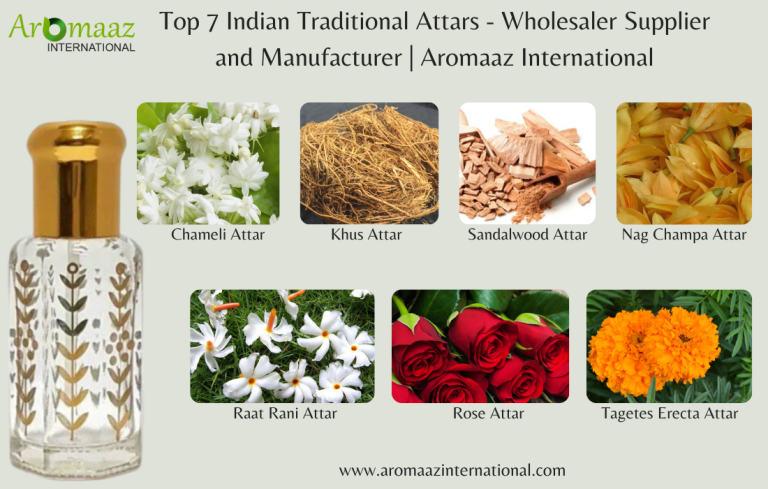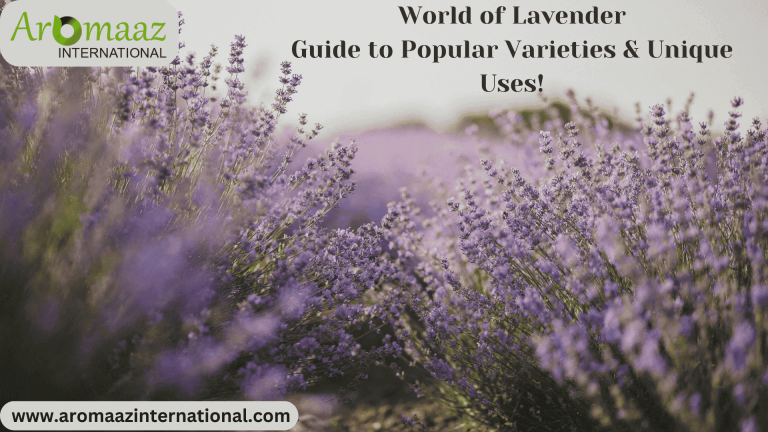Table Content
| 1. Introduction |
| 2. Benefits of Organic essential oils |
| 3. Importance of choosing high-quality Organic essential oils |
| 4. Difference between organic and non-organic essential oils |
| 5. Top Organic Essential Oils Brands |
| 6. Uses of Organic Essential Oils |
| 7. How to Use Organic Essential Oils |
| 8. Conclusion |
Introduction: –
As more people look for sustainable and ecological alternatives to traditional products, organic essential oils have become increasingly popular globally. These plant-based oils, which are obtained by cold pressing or distillation, are prized for their purity, adaptability, and medicinal qualities. Customers are switching to organic essential oils as a safer and more environmentally responsible alternative as they become more conscious of the possible risks associated with synthetic chemicals found in housekeeping, wellness, and personal care goods. Global suppliers like Aromaaz International, Natures Natural India and Aarnav Global Export have been essential in enabling a wider range of people to purchase these oils. These companies have gained the trust of customers looking for premium, pure oils that improve their lifestyle and health by emphasizing ethical sourcing, sustainable farming methods, and stringent quality testing. Organic essential oils are becoming commonplace in households worldwide for a variety of purposes, including aromatherapy, beauty, wellness, and cleaning, as the demand for natural solutions keeps growing.
Importance of choosing the right brand for purity and quality: –
Purity and Quality:
When it comes to organic essential oils, selecting the right brand is crucial for ensuring both purity and quality. Unlike conventional products, essential oils are highly concentrated plant extracts, meaning their effectiveness and safety are directly influenced by the sourcing, extraction methods, and overall quality control employed by the manufacturer. Choosing a reputable brand helps to ensure that the oils are free from contaminants, adulterants, or synthetic additives that could diminish their therapeutic benefits.
Sourcing and Sustainability:
Top-tier brands prioritize transparency, providing detailed information about the sourcing of their ingredients, the testing processes they use (such as GC-MS testing for purity), and certifications like USDA Organic, which guarantee that the oils are genuinely organic and free from harmful chemicals. Furthermore, trusted brands often adhere to sustainable and ethical sourcing practices, ensuring that the oils are produced in a way that supports environmental preservation and fair trade.
Transparency:
Opting for a high-quality brand also means you’re more likely to get oils that are effective, safe, and aligned with your health and wellness goals. With the increasing number of essential oil suppliers in the market, ensuring that you purchase from a reliable brand is essential to reap the full benefits of organic essential oils.
What are Organic Essential Oils?
Produced from plants cultivated without the use of artificial fertilizers, pesticides, or herbicides, organic essential oils are extremely concentrated plant extracts that can be obtained naturally through processes like cold pressing or steam distillation. These oils are frequently utilized in aromatherapy, cosmetics, and wellness activities because they encapsulate the plant’s inherent scent and therapeutic qualities. Essential oils must adhere to stringent certification requirements, such as those established by agencies like the USDA Organic or EU Organic, in order to be classified as organic. This guarantees that the plants used to produce the oils are grown using sustainable, environmentally friendly farming practices and in soil free from chemical treatments for a predetermined amount of time. Organic essential oils are highly valued due to their strength, purity, and lack of dangerous ingredients, which makes them a well-liked option for people looking for holistic and natural substitutes.
Difference between organic and non-organic essential oils: –
The primary difference between organic and non-organic essential oils lies in the way the plants used to produce the oils are grown and processed, which directly impacts their purity, quality, and safety.
1. Sourcing and Farming Practices:
Organic Essential Oils: These oils come from plants that are grown without the use of synthetic pesticides, herbicides, or genetically modified organisms (GMOs). The soil must be free from chemical treatments for at least three years before the plants can be labelled as organic. Organic farming practices also emphasize sustainability, crop rotation, and eco-friendly methods that protect the environment.
Non-Organic Essential Oils: Plants used in non-organic essential oils may be grown with synthetic chemicals, pesticides, herbicides, and fertilizers, which can leave harmful residues in the oil. These plants are also more likely to be subjected to genetically modified crops and intensive farming practices.
2. Purity and Contaminants:
Organic Essential Oils: Due to the absence of chemical additives in the farming process, organic essential oils are generally purer and free from contaminants, such as pesticide residues, heavy metals, or synthetic chemicals. They are also more likely to be subjected to stringent testing and certifications to ensure purity and quality.
Non-Organic Essential Oils: These oils can contain trace amounts of synthetic chemicals, pesticides, and solvents used during the extraction process. The presence of these residues can affect the aroma and therapeutic properties of the oil, making them less pure.
3. Certifications and Standards:
Organic Essential Oils: Organic essential oils typically carry certifications from trusted organizations such as the USDA Organic or EU Organic, ensuring that they meet strict guidelines regarding farming and production practices. These certifications guarantee that the oils are free from harmful chemicals and are produced in an environmentally sustainable manner.
Non-Organic Essential Oils: Non-organic essential oils do not carry such certifications, and their quality standards may vary widely. While they might still undergo testing for purity, they do not adhere to the same strict organic guidelines.
4. Environmental Impact:
Organic Essential Oils: The production of organic essential oils supports eco-friendly farming practices, such as soil conservation, water preservation, and biodiversity. Organic farming also helps reduce the carbon footprint and pollution by avoiding synthetic chemicals.
Non-Organic Essential Oils: The use of chemicals in non-organic farming practices can contribute to soil degradation, water contamination, and pollution. The environmental impact is generally higher due to the reliance on synthetic inputs.
5. Cost and Availability:
Organic Essential Oils: Due to the higher cost of organic farming practices, organic essential oils tend to be more expensive. They are less widely available, especially in certain regions, and their production can be more limited.
Non-Organic Essential Oils: These oils are typically less expensive and more readily available because the farming and production processes are less regulated and involve lower costs.
In summary, organic essential oils are made from plants grown without harmful chemicals, offering a purer, more sustainable, and environmentally friendly option. Non-organic essential oils, while still beneficial, may contain chemical residues and are produced using farming practices that have a higher environmental impact.
People Read Also: Top Essential Oil Brands of 2024: Quality, Purity, Wellness
Top Organic Essential Oils Brands: –
Brand 1: Aromaaz International
Overview of the Brand and Its Commitment to Purity: –
Aromaaz International is a leading global supplier and manufacturer of high-quality organic essential oils, renowned for its unwavering commitment to purity and sustainability. The brand has established itself as a trusted name in the essential oils industry by adhering to strict quality control standards and using the best manufacturing practices. Aromaaz ensures that all its oils are free from harmful chemicals, synthetic additives, and contaminants, offering 100% pure, therapeutic-grade oils.
The company sources its essential oils from organic farms and uses advanced distillation methods to preserve the plant’s natural properties. Aromaaz International’s dedication to ethical sourcing, coupled with its robust testing procedures (including GC-MS testing), guarantees the authenticity and potency of each product. Their oils are certified organic, ensuring that customers receive products that are both safe and effective for various applications like aromatherapy, skincare, and wellness.
Popular Oils They Offer: –
- Lavender Essential Oil: Known for its calming and soothing properties, Lavender oil is popular for stress relief, promoting relaxation, and aiding sleep. It’s a versatile oil commonly used in aromatherapy, skincare, and hair care.
- Peppermint Essential Oil: This refreshing oil is widely used to boost energy, improve focus, and alleviate headaches. It’s also effective in relieving digestive issues and soothing muscle pain, making it a must-have for any wellness routine.
- Tea Tree Essential Oil: Renowned for its powerful antibacterial and antifungal properties, Tea Tree oil is a go-to for treating acne, skin infections, and respiratory issues. It’s a popular choice in skincare products and as a natural disinfectant.
Aromaaz International’s reputation as a global supplier is built on its consistent delivery of premium essential oils, sourced ethically from the best farms worldwide, ensuring both quality and purity in every bottle.
Brand 2: Natures Natural India
Overview of the Brand and Its Commitment to Purity: –
Natures Natural India is a prominent manufacturer and supplier of high-quality essential oils, committed to providing 100% pure and organic products. The brand focuses on maintaining strict quality standards and ethical sourcing, ensuring their oils are free from chemicals and synthetic additives. Natures Natural India uses advanced distillation methods and follows sustainable farming practices to guarantee the purity and effectiveness of their oils.
Popular Oils They Offer: –
- Lavender Essential Oil: Known for its calming properties, ideal for reducing stress and promoting sleep.
- Peppermint Essential Oil: Refreshing and energizing, great for headaches, digestive issues, and mental clarity.
- Tea Tree Essential Oil: Renowned for its antibacterial and antifungal properties, perfect for skincare and treating infections.
Natures Natural India is trusted for its commitment to purity, offering high-quality essential oils that meet global standards.
Uses of Organic Essential Oils: –
1. Aromatherapy: –
- Creating a Relaxing Environment: Organic essential oils like Lavender and Chamomile are perfect for creating a calm, tranquil atmosphere. They help reduce stress, promote relaxation, and enhance sleep quality, making them ideal for diffusing in the evening or during meditation.
- Boosting Mood and Energy: Oils such as Peppermint and Lemon are invigorating and uplifting, providing an energy boost and improving mental clarity. They are perfect for combating fatigue and enhancing focus, especially in the morning or during work hours.
2. Skincare: –
- Treating Acne and Skin Irritations: Essential oils like Tea Tree and Rose are well-known for their antibacterial and anti-inflammatory properties, making them effective in treating acne, blemishes, and skin irritations. They help cleanse and heal the skin naturally.
- Hydrating and Rejuvenating Skin: Oils such as Frankincense and Geranium are excellent for hydrating dry skin and rejuvenating its appearance. They are often used in anti-aging skincare routines to improve elasticity and promote a healthy complexion.
3. Hair Care: –
- Promoting Healthy Hair Growth: Rosemary and Lavender oils are popular for promoting hair growth by improving circulation to the scalp and nourishing the hair follicles. Regular use can lead to stronger, healthier hair.
- Reducing Dandruff and Scalp Irritation: Tea Tree and Peppermint oils are great for soothing itchy scalps and reducing dandruff. They have antifungal and antiseptic properties, making them effective in treating common scalp conditions.
4. Household Cleaning: –
- Natural Disinfectants: Lemon and Eucalyptus essential oils are natural disinfectants with powerful antibacterial and antiviral properties, making them ideal for cleaning surfaces and purifying the air in the home.
- Freshening Up Spaces: Orange and Lavender oils are great for creating a fresh, clean atmosphere. They can be diffused in living spaces to reduce unpleasant Odors and promote a more pleasant, inviting environment.
5. Wellness and Healing: –
- Easing Headaches and Stress: Peppermint and Lavender oils are commonly used to alleviate headaches and reduce stress. They can be applied topically to the temples or inhaled to relieve tension and promote relaxation.
- Soothing Sore Muscles: Eucalyptus and Wintergreen oils are known for their analgesic properties, helping to soothe sore muscles and joints. They can be massaged into the skin or added to a warm bath for relief after exercise or physical strain.
Benefits of Organic Essential Oils: –
1. Health Benefits: –
- Stress Relief and Emotional Well-being: Organic essential oils such as Lavender and Chamomile are renowned for their calming effects. They help reduce anxiety, promote relaxation, and improve mood, making them valuable for managing stress and enhancing emotional well-being.
- Boosting Immune System and Fighting Infections: Oils like Tea Tree and Eucalyptus possess powerful antimicrobial properties that can support the immune system, fight infections, and promote respiratory health. These oils help cleanse the body and protect against harmful bacteria and viruses.
- Pain Relief and Anti-inflammatory Properties: Essential oils like Peppermint and Wintergreen are excellent for easing muscle and joint pain, as they contain natural analgesic and anti-inflammatory compounds. They provide relief from conditions like headaches, arthritis, and muscle soreness.
2. Cosmetic and Beauty Benefits: –
- Anti-aging Effects: Frankincense oil is known for its ability to reduce the appearance of fine lines and wrinkles, promoting youthful and radiant skin. It stimulates cell regeneration, which can help maintain a healthy complexion and reduce signs of aging.
- Brightening Skin Tone and Reducing Scars: Oils like Rose have excellent skin rejuvenating properties, helping to brighten the complexion and fade scars or dark spots. Their anti-inflammatory and healing qualities make them ideal for treating hyperpigmentation and improving skin texture.
3. Environmental and Ethical Benefits: –
- Eco-friendly Practices: Organic essential oils are produced using environmentally sustainable methods. The plants are grown without synthetic pesticides or fertilizers, ensuring that the farming process has minimal negative impact on the environment. These practices promote soil health, reduce water contamination, and help preserve biodiversity.
Supporting Organic Farming and Sustainable Sourcing: By purchasing organic essential oils, consumers support organic farming communities that prioritize ethical labour practices, fair trade, and sustainable sourcing. This encourages farmers to adopt eco-friendly agricultural methods and reduces the environmental footprint of the essential oils industry.
How to Use Organic Essential Oils: –
1. Diffusion: –
- Using a Diffuser: Diffusing essential oils is one of the most popular methods to enjoy their benefits. By using a diffuser, you can disperse oils into the air, filling your space with their natural aroma. This method is perfect for creating a relaxing environment, enhancing your mood, or improving focus. Popular oils for diffusion include Lavender for relaxation, Peppermint for focus, and Lemon for energy.
2. Topical Application: –
- Diluting Oils with a Carrier Oil: Essential oils are highly concentrated and should be diluted with a carrier oil (such as coconut oil, jojoba oil, or almond oil) before applying to the skin. This ensures safe and effective use while maximizing their therapeutic properties.
- Common Areas for Application:
- Temples: Apply Peppermint or Lavender oil to the temples to help relieve headaches and promote relaxation.
- Skin: Use Tea Tree oil for acne treatment or Rose oil for reducing scars and improving skin tone. Be sure to patch-test oils to ensure no irritation occurs.
3. Bath Soaks: –
- Adding Oils to Bathwater: Adding essential oils to your bath can transform it into a soothing and aromatic experience. Just a few drops of oils like Lavender, Chamomile, or Eucalyptus can promote relaxation, relieve stress, and help soothe sore muscles while you soak in a warm bath.
4. Massage: –
- Creating a Calming Massage Oil Blend: Mix a few drops of essential oils like Lavender, Frankincense, or Peppermint with a carrier oil to create a calming massage blend. This is great for easing muscle tension, alleviating pain, and promoting relaxation. A gentle massage with these oils can also help reduce stress and improve circulation.
5. Inhalation: –
- Inhaling Oils Directly or Using Steam: To enjoy the respiratory benefits of essential oils, you can inhale them directly or use a steam inhalation. Add a few drops of oils like Eucalyptus or Peppermint to a bowl of hot water, cover your head with a towel, and breathe deeply. This can help clear your sinuses, improve breathing, and alleviate congestion.
Global Supplier of Organic Essential Oils: –
As a leading supplier of Organic Essential Oils, we offer our premium essential oil formulations to a global clientele. Our Organic Essential Oils known for its calming and soothing properties, is available to customers across diverse regions including the United States, Canada, United Kingdom, Saudi Arabia, Germany, South Korea, Brazil, Romania, Poland, Turkey, Spain, Thailand, Egypt, Japan, China, Ukraine, Armenia, Nigeria, Vietnam, Iran, and beyond. We ensure reliable and efficient distribution, providing high-quality products that support relaxation and well-being for individuals and businesses around the world.
Choosing the Best Organic Essential Oils Brand: –
Factors to Consider: –
Purity and Authenticity of Oils: Ensure the oils are 100% pure, free from additives or synthetic chemicals. Look for transparency in sourcing and extraction methods.
Certifications and Testing: Opt for brands with certifications like USDA Organic and those that provide GC/MS testing reports to guarantee the oils’ purity and quality.
Brand Reputation and Customer Reviews: Check customer feedback and the brand’s reputation in the market to ensure reliability and trustworthiness.
Price vs. Quality Balance: While organic essential oils can be expensive, balance the cost with quality. Choose brands that offer competitive pricing without compromising on purity and effectiveness.
Conclusion: –
In conclusion, choosing the best organic essential oils brand is essential for ensuring you receive the full range of benefits these oils can offer. Brands like Aromaaz International stand out for their commitment to purity, quality, and sustainability, making them a top choice for those seeking therapeutic-grade oils. By selecting a reputable brand that prioritizes certifications, rigorous testing, and ethical sourcing, such as Aromaaz International, you can be confident in the authenticity and effectiveness of the oils you use. Whether for relaxation, skincare, or wellness, investing in high-quality organic essential oils from trusted brands guarantees maximum benefits and promotes a healthier, more sustainable lifestyle.



